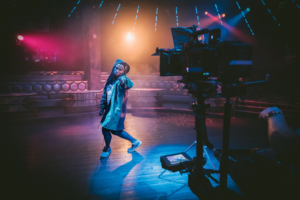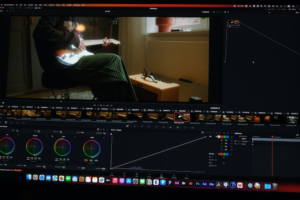
In multimedia, whether it’s making music videos, film, or any visual storytelling medium, the art of synchronizing audio and visuals is nothing short of magic.
It’s the invisible thread that weaves the auditory and visual elements together, creating a seamless, immersive experience for the audience.
In this blog, we’ll dive into the intricacies of syncing audio with video and explore techniques to help you achieve that perfect harmony in your creative projects.
The Importance of Syncing Audio and Visuals
Before we embark on our journey into the art of synchronization, let’s understand why it’s so vital.
Audio and visuals are two powerful storytelling tools, and when they work in perfect harmony, they can elevate your project to a whole new level. Imagine a suspenseful scene in a film where the tension is heightened not just by what you see but also by the music that accompanies it. That’s the magic of sync.
1. Plan Ahead with A Storyboard
Start by creating a storyboard or a visual plan for your project. This will help you identify the key moments where audio and visuals need to sync.
2. Use the Right Tools
Invest in a good Digital Audio Workstation (DAW)for audio editing. This will give you precise control over your audio tracks. Similarly, robust video editing software will allow you to manipulate visuals precisely.

3. Timing is Everything
Use a timecode to ensure that your audio and video files are perfectly synchronized. This is crucial for larger projects and professional productions.
4. Visual Cues
Use visual markers or cues in your video editing software to indicate where specific audio events should occur. This can be a visual peak or a change in the scene.
5. Audio Cues
Similarly, use audio markers to indicate where specific visual events should occur. This can be a musical cue or a change in the audio ambiance.
6. Iteration and Feedback
Regularly preview your project with both audio and visuals together. Solicit feedback from others to ensure that the synchronization is working effectively.
7. Don’t Forget the Human Element
Remember that syncing is not just about technical precision but also emotional impact. The right music at the right moment can evoke powerful feelings in your audience.
8. Experiment and Learn
Don’t be afraid to experiment. Sometimes, the most innovative sync moments come from trying something unconventional.
Synchronizing audio and visuals is an art form that can elevate your creative projects to new heights. It’s not just about technical precision but also about emotional impact. When audio and visuals work seamlessly together, they can immerse your audience in your story, captivate their senses, and leave a lasting impression. So, whether you’re making music videos, a film, a commercial, or any multimedia project, remember that the art of synchronization can make the difference between a good project and an unforgettable one. If you need more help, feel free to reach out to our team at Eclipse Studios. We offer music studio services as one of Orlando’s best recording studios.
Get in touch with us to learn more.
